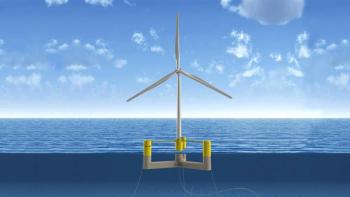June 23, 24 and 28, Colby College researchers came to Boothbay Harbor to gather community thoughts on offshore wind power, with help from a virtual reality wind farm. “We’re trying to understand the full range of perceptions around offshore wind energy,” said Alison Bates, who is leading the project. “We are looking at how working waterfronts and coastal communities think about the nuanced ways that communities might benefit or be impacted.”
Bates, a professor in Colby’s environmental studies department, came to Boothbay Harbor June 23, 24 and 28 to conduct interviews with community members at Boothbay Harbor Memorial Library. She came with a team of three student research assistants and Colby professor Stacy Doore.
Bates said the researchers wanted to hear from a range of people who have a vested stake in the community, including both seasonal and permanent residents, business owners, and people who work on the water. According to the researchers, the collected data is confidential, and participants were compensated for their time.
During the interview, participants were seated in a quiet room where they were asked a series of questions about themselves and their thoughts on offshore wind power.
They were then presented with a virtual reality experience that, according to the researchers, was created to accurately represent an offshore wind farm. Participants were then asked more questions based on the virtual experience.
"We wanted to make sure that anything that people see is actually spatially, visually and acoustically accurate,” Doore said. “We spent a lot of time building it so we’re not misrepresenting what a wind farm might look like."
Doore, a computer scientist, studies spatial information access and how people make decisions based on spatial perception, including virtual scenarios. She said since people tend to be poor at estimating distance and scale, the virtual reality experience helps them see what a wind farm looks like in a way a two-dimensional image does not.
"It’s really different reasoning when you are looking from a map above (than) walking through an environment ...," she said. “(It) gives you an experience as opposed to having to imagine a wind farm. You can actually see what that might be and feel it in terms of your body's senses."
According to the researchers, a virtual reality experience helps participants form more realistic opinions. They said people are often surprised by what they see because it’s hard to imagine what an offshore wind farm looks like. "These things are pretty far off,” Doore said. "If you're imagining them right out of your window kind of thing, this should help alleviate some of those concerns about what you can see at different distances."
The virtual reality experience is part of the researchers’ goal to gather well-informed opinions about wind power. There have been many proposals for offshore wind in Maine, including the proposed New England Aqua Ventus project in the Boothbay region. According to Bates, projects like these and the policies around them may benefit from more community dialogue.
“We're not sure if the full range of perceptions always ends up in the decision-making process,” she said. “So we're trying to give voice and provide an avenue for people who may not be able to participate in public engagement processes and decision making.”
Bates and her team are speaking with communities that have already had offshore wind engagement, and they also visited Harpswell in June. Doore said choosing only two places helps researchers focus on meaningful relationships.
Part of that is reaching back out to participants and their communities, according to the researchers. The project is supported by Maine and federal agencies that also have an interest in sharing the results, including the U.S. Office of Energy Efficiency and Renewable Energy, National Oceanic and Atmospheric Administration (NOAA) Fisheries, Maine Sea Grant and Maine Department of Natural Resources.
Bates said the data from the interviews is not ready to be analyzed and there are no results yet, but she has heard a wide array of opinions from people in many professions. She said some people are concerned about the impacts of offshore wind on culture and heritage and others are motivated by the transition to clean energy.
Many are just happy to be heard, said Emma Rothwell, a student research assistant on the project. She said a number of people, including herself, get frustrated when laws and policies get made without community participation. Even having to write a letter or show up to a meeting with the courage to speak up discourages input, she said.
"The impression I've received from people on the Midcoast is that everyone is so grateful that we’re asking for their opinions,” she said. “Here, we are inviting people, we have an incentive, and everyone's really encouraged to share what they think.”
























